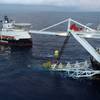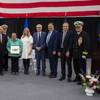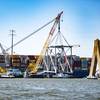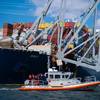Port and maritime security matters continue to dominate the agenda list of marine companies and organizations. While an unprecedented international effort to thwart terrorist attacks has seemingly had some positive impact, the heightened awareness has exposed fissures in the system.
At a meeting of the IMO Maritime Safety Committee's Intersessional Working Group on Maritime Security (ISWG), the group fast-forwarded a number of topical matters, including an agreement to discuss the accelerations of the implementation schedule for the mandatory fitting of Automatic Identification Systems for all ships of 500 gross tonnage and above, on international voyages. While such talk undoubtedly makes the hearts of marine electronics manufacturers swoon, it gives vessel owners, and operators — which must ultimately foot the bill and pass along the cost — cause for pause.
Congruent with this security theme, a collection of leaders from the military, the U.S. Senate and industry met in Washington, D.C. on February 26 to lobby for an additional $2.9 billion in the FY 03 budget for the purpose of building more new Navy ships. The president’s proposal, which requests $6.1 billion for the procurement of five new Navy vessels, is a slap in the face of estimates which say between 10 to 12 new ships per year are needed to maintain a healthy fleet. For too long the Navy has been told “next year we’ll make it up,” but leaders such as Northrop Grumman’s Phil Dur; Senators Thad Cochran, (R-Miss.), and Jack Reed, (D-R.I.); and Admiral Robert Natter are determined to make next year this year.
Security and Navy aside, the commercial marine business remains a viable venture, though consolidation and a sour economy have colluded to cloud that reality. Technology remains the driver of the marine market, as highlighted in this month’s Tanker Technology section. Spain’s IZAR very proudly launched its first LNG ship in more than three decades — the Iñigo Tapias — a marker that surely serves as a signal supporting IZAR management’s contention that this is the “decade of gas.” With five such ships on order and four more slots to fill, IZAR is making a run in a market niche that has slid to yards in the Far East.
Sponsored Content
Chris-Marine’s solutions help to prolong engine lifetime

AST is now AST Networks, bringing you remote connectivity wherever you are

March 2024
 Read the Magazine
Read the Magazine

 Read the Magazine
Read the Magazine
This issue sponsored by:

Dredging: Plenty of Issues, New WRDA on the Way
Subscribe for
Maritime Reporter E-News
Maritime Reporter E-News is the maritime industry's largest circulation and most authoritative ENews Service, delivered to your Email five times per week












